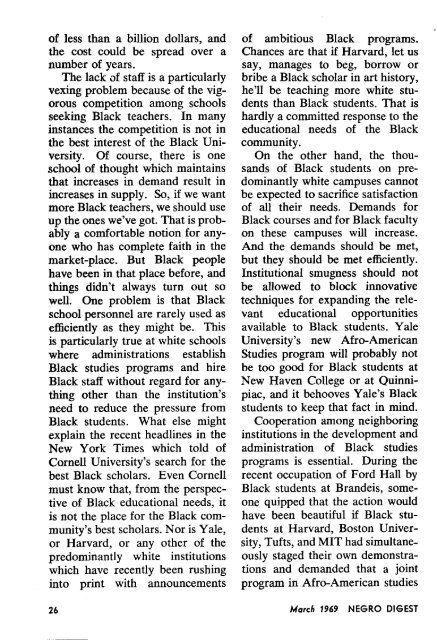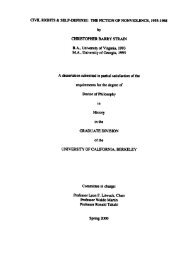Negro Digest - Freedom Archives
Negro Digest - Freedom Archives
Negro Digest - Freedom Archives
Create successful ePaper yourself
Turn your PDF publications into a flip-book with our unique Google optimized e-Paper software.
of less than a billion dollars, and<br />
the cost could be spread over a<br />
number of years.<br />
The lack of staff is a particularly<br />
vexing problem because of the vigorous<br />
competition among schools<br />
seeking Black teachers . In many<br />
instances the competition is not in<br />
the best interest of the Black University<br />
. Of course, there is one<br />
school of thought which maintains<br />
that increases in demand result in<br />
increases in supply. So, if we want<br />
more Black teachers, we should use<br />
up the ones we've got. That is probably<br />
a comfortable notion for anyone<br />
who has complete faith in the<br />
market-place . But Black people<br />
have been in that place before, and<br />
things didn't always turn out so<br />
well . One problem is that Black<br />
school personnel are rarely used as<br />
efficiently as they might be. This<br />
is particularly true at white schools<br />
where administrations establish<br />
Black studies programs and hire<br />
Black staff without regard for anything<br />
other than the institution's<br />
need to reduce the pressure from<br />
Black students . What else might<br />
explain the recent headlir_es in the<br />
New York Times which told of<br />
Cornell University's search for the<br />
best Black scholars . Even Cornell<br />
must know that, from the perspective<br />
of Black educational needs, it<br />
is not the place for the Black community's<br />
best scholars . Nor is Yale,<br />
or Harvard, or any other of the<br />
predominantly white institutions<br />
which have recently been rushing<br />
into print with announcements<br />
26<br />
of ambitious Black programs .<br />
Chances are that if Harvard, let us<br />
say, manages to beg, borrow or<br />
bribe a Black scholar in art history,<br />
he'll be teaching more white students<br />
than Black students . That is<br />
hardly a committed response to the<br />
educational needs of the Black<br />
community .<br />
On the other hand, the thousands<br />
of Black students on predominantly<br />
white campuses cannot<br />
be expected to sacrifice satisfaction<br />
of all their needs . Demands for<br />
Black courses and far Black faculty<br />
on these campuses will increase .<br />
And the demands should be met,<br />
but they should be met efficiently .<br />
Institutional smugness should not<br />
be allowed to block innovative<br />
techniques for expanding the relevant<br />
educational opportunities<br />
available to Black students . Yale<br />
University's new Afro-American<br />
Studies program will probably not<br />
be too good for Black students at<br />
New Haven College or at Quinnipiac,<br />
and it behooves Yale's Black<br />
students to keep that fact in mind .<br />
Cooperation among neighbaring<br />
institutions in the development and<br />
administration of Black studies<br />
programs is essential . During the<br />
recent occupation of Ford Hall by<br />
Black students at Brandeis, someone<br />
quipped that the action would<br />
have been beautiful if Black students<br />
at Harvard, Boston University,<br />
Tufts, and MIT had simultaneously<br />
staged their own demonstrations<br />
and demanded that a joint<br />
program in Afro-American studies<br />
March 1969 NEGRO DIGEST
















